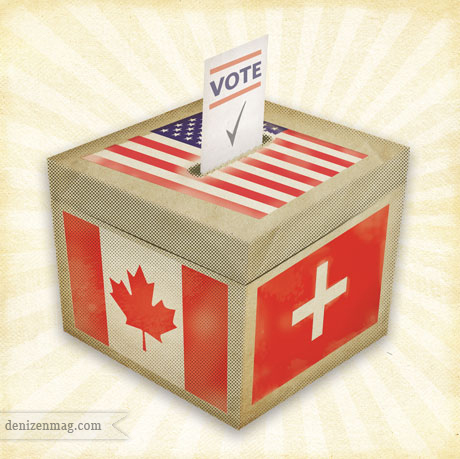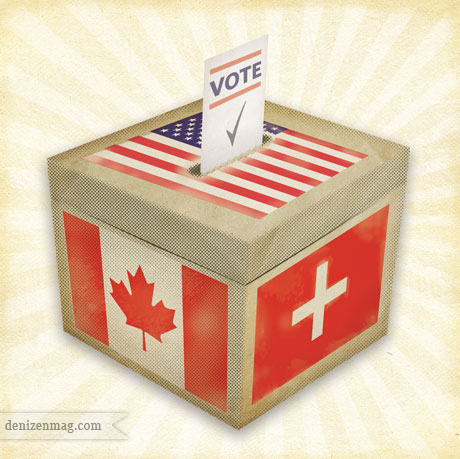
Illustration for Denizen by Lindsey Ruane
I’ve never voted.
Not in Switzerland, where I grew up; not in Canada, where I was born; not in Iran, where my parents are from, and not in the U.S. or France, where I’ve worked and studied.
It’s not that I don’t see the value in participatory democracy. In many ways, I am a model voter: engaged, educated, knowledgeable. I read political theory for fun, and not-so-secretly dream of someday writing my own utopian tract, a Plato’s Republic for the 21st century. Even though I am frustrated by the base level of political discourse, I am far from being a disenfranchised person. I am not stateless. Quite on the contrary: I am over-stated.
Today, I live in a place where I have no say: the United States — and could have a say in places where I do not live: Switzerland, Canada and Iran. I hold a right to three votes that I believe many others are more entitled to, and have no entitlements where I think my vote should count.
I find it absurd that my opinion about genetically modified foods should supersede the opinion of a non-naturalized Swiss resident who actually shops in a Swiss supermarket. I’m not the one buying the potatoes, after all. If voting in Switzerland is a privilege, then it is a privilege to which I, a non-resident national, don’t feel entitled.
Should all non-resident nationals should abstain from voting? That’s impossible to universalize. I imagine that if I envisioned moving to Switzerland in the near future – I’d feel differently about my abstinence come election day. It would be downright silly to tell diplomats not to vote in the country they represent abroad, and I can understand why refugees or exiles who maintain strong ties to their home country would want to exercise their rights remotely.
Today, there exist large groups of individuals who can’t vote in their country of residence, but for all intents and purposes, should have a say. I have found myself in such a situation, and the civic powerlessness that comes with living abroad has forced me to detach.
“I’m not American” is a convenient truth to get canvassers outside the New York subway station to back off. But at the same time, I have a tendency to roll my eyes when, say, Congress, is on the brink of total collapse. I am told repeatedly that it’s not my country. Why make it my problem?
If we are to preserve democracy in a globalized world with an increasingly transnational workforce, this voting conundrum needs to be remedied. One solution would be to redefine nationality, citizenship, and residency, and adjust voting rights accordingly.
At present, citizenship and nationality are often taken to mean the same thing, but there are distinctions to be made. The definition of nationality is affiliation with a particular nation or sovereign state: it carries with it full privileges (and civic duties) that citizenship does not necessarily come with.
In the European Union, for instance, anyone with a French, German, Polish, etc. passport is considered an EU citizen, but not a national. EU citizens can live and work freely throughout the European Union, and can vote in all local and European elections, but unless they become naturalized in a second country, they cannot vote in national elections. So a Frenchman living in Berlin may be a German citizen, but cannot directly vote Angela Merckel out of office. Nor does he have to do military service. A naturalized Frenchman in Berlin, on the other hand, has all the privileges and obligations of a German-born child of German parents. A resident — even a permanent resident — has rights only to live and work, and, depending on the place, vote locally.
Rather than sticking to these old definitions and the privileges they accompany, wouldn’t it make sense to open up voting rights to residents and citizens, and take them away from nonresident nationals after a certain period of time? If the goal is to gather the votes of ones’ constituents, why categorically ignore those born elsewhere?
It’s high time to amend the one-man one-vote model to include people long considered political non-men. There’s a long precedent for this form of action in the civil rights and women’s suffrage movements of the past, and the logical next step is to demand suffrage for so-called resident aliens. Opening up the vote won’t remedy the sorry state of leadership around the world — the vested interests of governments in banks and large businesses; the corruption, cronyism, and other objectionable “isms” that exists in politics today. But it will yield a more representative result.
As we watch people all around the world protest against their leaders, against austerity, against crass inequality and conflicts of interests, perhaps we should add to the list of demands a very basic one: the right to vote in the place where you live. Right now, it might seem radical, even laughable for a bunch of foreigners to demand fair treatment and, above all, equal representation. But someday, like the movements that came before, it will be considered plausible. Normal, even.

Good stuff here. The times are changing, we are more and more becoming global citizens. This voting thing is rather complicated!
LikeLike
I’m one of the lucky ones. I’m actually entitled to vote in all three of the countries I’ve ever lived in, despite holding only ONE passport: the United Kingdom by virtue of being a Commonwealth citizen; Hong Kong, by virtue of being a native-born permanent resident; and Malaysia by virtue of my nationality, so the idea of foreign nationals voting abroad is actually a tried and tested one. Ironically enough, the Malaysian government took six months to register me as a voter earlier this year; I only got my voting slip shortly AFTER the election in the Malaysian state where I happen to live. I’ve never felt so disenfranchised in my life.
What about countries such as the United Arab Emirates, where over 80% of the population is Non-Emirati?
LikeLike
Great article! I’m a Filipino citizen who studied and currently works and lives (through an H1-B visa) in the US. I find it absurd that while the federal and state governments take money out of my paycheck to fund numerous government projects – from paving the roads to paying for the troops – I get no representation in Congress. Ironic, considering that “no taxation without representation” was one of the main grievances of the first 13 colonies that eventually resulted in the creation of this country.
LikeLike
Just a comment about Canada’s laws… I’m a citizen, but it seems that because I was born outside Canada to a Canadian parent, if I had a child born outside Canada, they would not be a citizen, whereas a naturalized citizen’s would be…
LikeLike